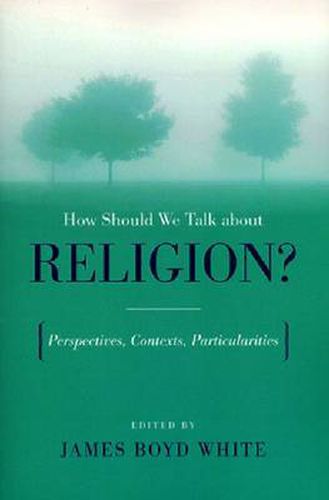Readings Newsletter
Become a Readings Member to make your shopping experience even easier.
Sign in or sign up for free!
You’re not far away from qualifying for FREE standard shipping within Australia
You’ve qualified for FREE standard shipping within Australia
The cart is loading…






In this wide-ranging and timely volume, fourteen scholars address the important question, How should we talk about religion, whether our own or the religion of others? They confront such fundamental topics as the sufficiency of
reason for a full life; the adequacy of our methods of describing and analyzing religion; the degree to which any serious confrontation with the religious experiences of others will challenge our own; and whether there can be a pluralism that does not dissolve into universal relativism.
Writing from a diversity of perspectives and academic disciplines-philosophy, classics, medieval studies, history, anthropology, economics, political science, and art history, among others-the contributors illuminate issues at the heart of the most significant cultural, social, and political debates of our day.
What emerges is not a univocal answer to the question posed in the title. Instead, by demonstrating how religion is talked about in the languages of very different academic disciplines, the essayists creatively address issues that no one should ignore: fundamentalism; the role of religion in American democracy; the tension between secular liberalism and religious rhetoric; monotheism versus pluralism; and the relationship between poverty and liberation theology. Collectively, their various approaches to talking about religion-differences due to background, age, nationality, religious outlook, and intellectual commitment, yet all valid-provide a general response to the question in the book’s title: in intellectual and personal community.
Contributorss: Luis E. Bacigalupo, Clifford Ando, Sabine MacCormack, R. Scott Appleby, Bilinda Straight, Patrick J. Deneen, Wayne C. Booth (1921-2005), Eugene Garver, Javier Iguiniz Echeverria, Ruth Abbey, Sol Serrano, Carol Bier, Jeffrey Kripal, Ebrahim Moosa.
$9.00 standard shipping within Australia
FREE standard shipping within Australia for orders over $100.00
Express & International shipping calculated at checkout
In this wide-ranging and timely volume, fourteen scholars address the important question, How should we talk about religion, whether our own or the religion of others? They confront such fundamental topics as the sufficiency of
reason for a full life; the adequacy of our methods of describing and analyzing religion; the degree to which any serious confrontation with the religious experiences of others will challenge our own; and whether there can be a pluralism that does not dissolve into universal relativism.
Writing from a diversity of perspectives and academic disciplines-philosophy, classics, medieval studies, history, anthropology, economics, political science, and art history, among others-the contributors illuminate issues at the heart of the most significant cultural, social, and political debates of our day.
What emerges is not a univocal answer to the question posed in the title. Instead, by demonstrating how religion is talked about in the languages of very different academic disciplines, the essayists creatively address issues that no one should ignore: fundamentalism; the role of religion in American democracy; the tension between secular liberalism and religious rhetoric; monotheism versus pluralism; and the relationship between poverty and liberation theology. Collectively, their various approaches to talking about religion-differences due to background, age, nationality, religious outlook, and intellectual commitment, yet all valid-provide a general response to the question in the book’s title: in intellectual and personal community.
Contributorss: Luis E. Bacigalupo, Clifford Ando, Sabine MacCormack, R. Scott Appleby, Bilinda Straight, Patrick J. Deneen, Wayne C. Booth (1921-2005), Eugene Garver, Javier Iguiniz Echeverria, Ruth Abbey, Sol Serrano, Carol Bier, Jeffrey Kripal, Ebrahim Moosa.